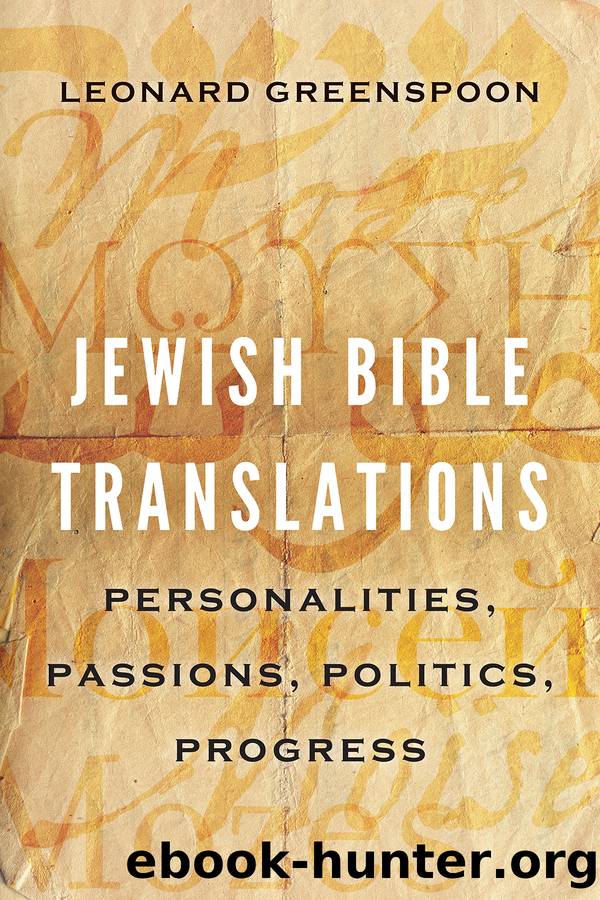Jewish Bible Translations by Leonard Greenspoon

Author:Leonard Greenspoon [Greenspoon, Leonard]
Language: eng
Format: epub
Tags: REL040040 Religion / Judaism / Sacred Writings, REL006630 Religion / Biblical Studies / History & Culture, REL006400 Religion / Biblical Studies / Exegesis & Hermeneutics
Publisher: The Jewish Publication Society
Anglo-Jewish Versions in the Eighteenth and Nineteenth Centuries
As the Jewish community grew more rooted in English soil, it sought to cast off at least some of the trappings that identified its members as immigrants. For example, the two pamphlets from the Bodleian mentioned earlier signal that the preparation of an English version of the Hebrew Bible was not an isolated event. English-language sermons and English-Hebrew prayer books were being produced almost simultaneouslyâand sometimes under the same auspices.37
Larger political and social events during the eighteenth and nineteenth centuries would also have their effect on Anglo-Jewish translators and their respective translations. In 1753, Parliament passed the Jewish Naturalization Bill (often simply referred to as âthe Jew Billâ), which would have provided the means through which foreign-born Jews could acquire the privileges of native Jews. But popular agitation against this bill led to its almost immediate rescission. In the early decades of the 1800s Jews mounted increasingly effective campaigns to achieve official equality. Along with their allies, they were rewarded in 1833 with the passage of an emancipation bill in the House of Commons, only to see their hopes thwarted by the billâs defeat in the House of Lords.
Outside of Parliament, Jews were received more favorably. In 1833, the same year the emancipation bill failed, the first Jew was admitted to the bar. Two years later, a Jew was appointed as sheriff, another first in English history. In 1837, Queen Victoria knighted the influential banker, philanthropist, and Jewish communal leader Moses Montefiore. In 1841, the financier Isaac Lyon Goldsmid was made a baronetâthe first Jew to receive a hereditary title.38 In 1855, Sir David Salomons took office as the first Jewish lord mayor of London.
Finally, after this series of actions that were advancing the status of British Jews (or at least a few of them), Parliament began to respond positively. In 1858 Parliament changed the rules regulating membership in the House of Commons: For the first time, members could take office without swearing an oath as to their adherence to Christianity. As a result, that year, Parliament officially recognized its first Jewish member: Lionel de Rothschild.39 He had actually been elected to his seat more than a decade earlier, but it took until July 26, 1858, for Parliament to formally accept him. In 1885, Nathan Mayer Rothschild became the first Jew to ascend to the House of Lords. By 1890, almost all other legal impediments to full participation in civic life had been removed for British Jews.
Concurrently, the Jewish community took a number of significant steps to strengthen its cohesion and leadership. In 1841, for example, the first Anglo-Jewish periodical, The Jewish Chronicle, began publication. In 1855, Jewsâ College was founded in London as a theological seminary; in the early 1880s it became affiliated with University College London. The Jewish Board of Guardians began offering welfare services to the communityâs poor in 1859. In 1863, leaders of the Ashkenazic and Sephardic communities joined forces to provide greater stature to the Board of Deputies of British Jews, the main representative body for the community at large.
Download
This site does not store any files on its server. We only index and link to content provided by other sites. Please contact the content providers to delete copyright contents if any and email us, we'll remove relevant links or contents immediately.
Fangirl by Rainbow Rowell(9254)
How to Bang a Billionaire by Alexis Hall(8157)
Wonder by R. J. Palacio(8113)
The Thirst by Nesbo Jo(6944)
The Space Between by Michelle L. Teichman(6942)
Assassin’s Fate by Robin Hobb(6223)
Wiseguy by Nicholas Pileggi(5787)
The Night Circus by Erin Morgenstern(5226)
Paper Towns by Green John(5191)
The Kite Runner by Khaled Hosseini(5181)
Bittersweet (True North #1) by Sarina Bowen(4846)
Gerald's Game by Stephen King(4654)
Too Much and Not the Mood by Durga Chew-Bose(4348)
Pillow Thoughts by Courtney Peppernell(4284)
Goodbye Paradise(3811)
Twelve Days of Christmas by Debbie Macomber(3568)
Good by S. Walden(3560)
The Rosie Effect by Graeme Simsion(3469)
The Cellar by Natasha Preston(3346)
